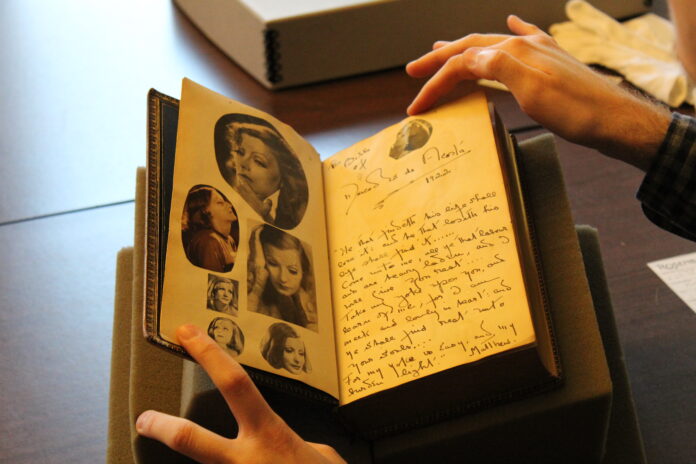
As part of the Behind the Bookcase tour series, The Rosenbach Museum and Library in Philadelphia will offer the tour “Here Lies the Heart: Mercedes de Acosta and the Power of Queer Storytelling.” On March 9, participants in the workshop-style tour will learn about and discuss the typescript, proof pages and published first editions of de Acosta’s memoir “Here Lies the Heart,” which sheds light on her work as a lesbian playwright, poet and memoirist in New York and Hollywood in the early 20th century. Her memoir also details accounts of her platonic and romantic relationships with actresses and artists including Marlene Dietrich, Eva Le Gallienne, Greta Garbo and dancer Isadora Duncan.
“For this tour, which really gives us an opportunity to dive into Acosta’s legacy, we decided to focus on the idea of authorship in storytelling as we encounter it in the archive of Mercedes de Acosta’s life,” said Alex Ames, director of outreach and engagement at The Rosenbach. “The tour will give our visitors an opportunity to essentially journey with Mercedes de Acosta as she constructed the narrative that was eventually published in ‘Here Lies the Heart.’”
De Acosta has been described as an icon of LGBTQ history, due in part to her authentic, unapologetic way of life and the topics she explored in her work, which include lesbian desire, strong women in unfulfilled marriages, and other lesbian struggles. The unconventional themes in de Acosta’s work meant that she received criticism and rejection from producers and directors, but nonetheless remained resilient and outspoken.
Historians have reported that de Acosta thought she was a boy until she was seven years old, at which time her mother sent her to a convent school to learn how to be feminine. She then began questioning her sexuality, and wrote that she was neither a boy nor a girl, or perhaps both. By 15 years old, she was stricken with guilt for being sexually attracted to girls.
“She was a woman in lifelong turmoil, which informed her future writing and her life,” according to Dr. Robert Schanke, author of the biography “That Furious Lesbian: The Story of Mercedes de Acosta.”
Despite living a somewhat tumultuous life, de Acosta was more open about her sexuality and relationships than others in her social circle, as evidenced by her memoir. Though not a great financial success, “Here Lies the Heart” got significant attention among de Acosta’s friends and lovers.
“Some folks were furious with what she was writing about, even if she wasn’t totally open about it,” said Isabel Steven, coordinator of public programs at the Rosenbach. “She sort of alluded to things, but it was still pretty open in some respects. A lot of her friends were very frustrated and some ended their relationships or their friendships with her. Others, like Marlene Dietrich, loved it.”
Nonetheless, de Acosta’s memoir left indelible marks on LGBTQ cultural history.
“Her story challenges assumptions about the history of the LGBTQIA+ community,” Ames said. “It provides another facet on what queer experience was like across time and space.”
Ames also pointed out the duality of how de Acosta lived her life: that she lived authentically without compromise, yet she was met with creative and at times romantic rejection, and she felt alienated because her concept of sexuality did not conform to societal norms.
“In ‘Here Lies the Heart’ we see the broad and deep psychological impact of otherness on human life,” Ames said. “It swings both ways. On the one hand, you can read the life of Mercedes de Acosta through a tragic lens, that this is a person who struggled. On the other hand, she would not have been the creative genius she was had she not occupied liminal status in the society she inhabited. She writes about this in the book.”
Steven underscored the fact that despite the depth and complexity of de Acosta’s life and work, many only know her for her relationships with famous actresses.
“There has not been a whole lot of attention paid to the work that she was doing, the poetry that she was writing, the plays that she was writing and in some cases producing,” Steven said. “I think a component of her middling success and for a time lack of recognition of her work, is the fact that her themes were so directly about issues that were taboo at the time: same-sex desire, suicide, incest, female desire.”
Ames and Steven both highlighted de Acosta’s repurposed Christian Bible as another fascinating object of hers, which will also be part of the tour. Raised Catholic, de Acosta was a spiritual person and studied Buddhism and Hinduism throughout her life.
“Her bible really becomes this sort of scrapbook,” Steven said. “She has photographs of her various lovers in the front pages, and she kept [the bible] next to her bedside table. It was clearly used very heavily by Mercedes and was very close to her. So that represents some of the intricacies of her life and how she felt about the world.”
On the tour, Ames and his collaborators are hoping to learn from participants as much as they hope they will learn from de Acosta’s writings and possessions.
“Our Behind the Bookcase tour program really places an emphasis on conversation and dialogue around our collections objects,” Ames said. “I would encourage anyone who is interested in thinking about identity and empowerment and how we tell our stories, to sign up for the experience, and to know that not only will this be an opportunity to see some really amazing objects up close and personal, but it’s an opportunity to help create the sense of queer community that we all can benefit so much from.”
For event tickets and more information, visit https://rosenbach.org/.